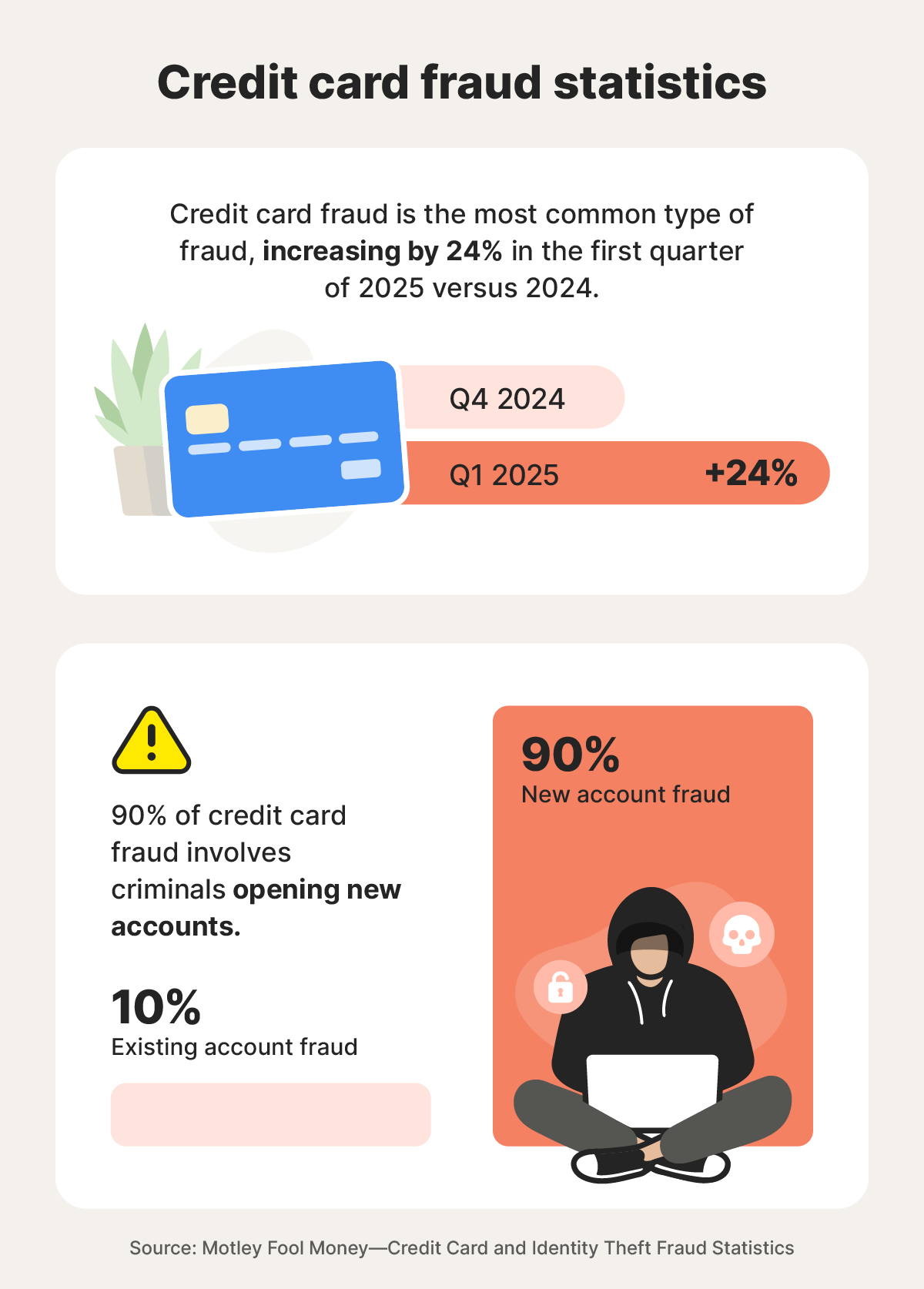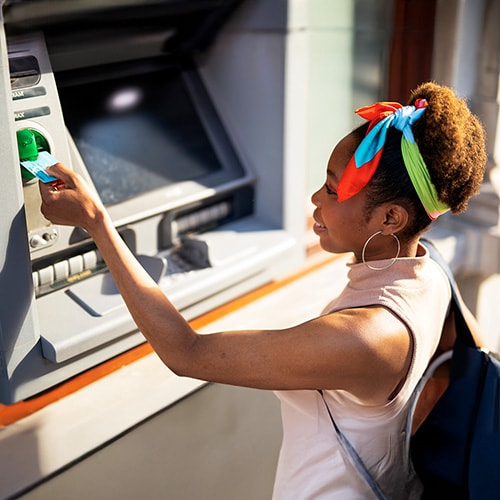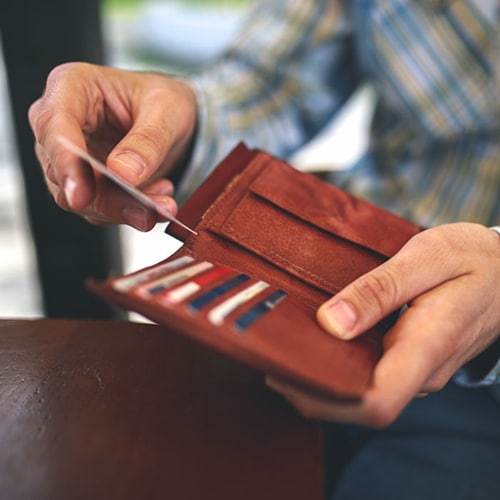Losing your credit card is stressful, but acting fast can help protect you against the worst consequences. There were nearly 450,000 reports of credit card fraud in 2024, and your card going missing puts you at increased risk of becoming another victim.
If a fraudster gets hold of your credit card, they can rack up unauthorized charges and leave you with the hassle of disputing them. Worse, they may end up damaging your credit score or using your details to commit further credit fraud.
Follow this six-step process to protect your lost credit card and help keep your finances safer.
1. Lock your credit card
Locking a lost credit card prevents anyone who finds it from using it to make purchases or withdrawals, giving you time to find or cancel it. Until you unlock your card, your bank will block any attempted transactions. You might also receive a notification if someone tries to use it, confirming that it’s been stolen.
After locking your card, make sure you’ve not misplaced it somewhere obvious, like:
- In your pockets: Check the pockets of all clothing you’ve worn recently to see if your card is loose.
- Between car seats: Check between and under your car seats and inside your glove compartment.
- Around the house: Check hidden spots like between your couch cushions and under your bed, where your card could have landed if it fell out of your pocket.
- Where you last shopped: Call the last place you remember using your card to see if they have it. You can also contact your bank to see if somebody turned it in.
Review your transaction history to help remind yourself where you last made a purchase. Also, look out for any transactions you don’t remember making for clues that your card has fallen into a fraudster's hands.
2. Contact your card issuer
If you can’t find your credit card, contact your issuer to notify them that it’s lost. They’ll help you cancel it to remove the risk of a fraudster racking up charges, and you can request a replacement card. The earlier you report a lost or stolen card, the more likely you’ll prevent financial losses.
You can also take this opportunity to dispute any fraudulent charges you’ve noticed on your statement. According to the Fair Credit Billing Act (FCBA), your liability for unauthorized charges is limited to $50 if you challenge fraudulent entries within 60 days. Certain credit cards even offer zero-liability protection to protect you from 100% of charges.
Some card issuers let you submit loss reports online or using their app, while others require you to call in. Here are contact numbers for some of the most popular credit card companies:
Credit card issuer |
Phone number |
|---|---|
American Express |
1-800-528-4800 |
Chase |
1-800-432-3117 |
Citibank |
1-800-950-5114 |
Wells Fargo |
1-800-869-3557 |
Synchrony |
1-844-406-7427 |
Capital One |
1-800-227-4825 |
Discover |
1-800-347-2683 |
3. File a police report
Next, contact your local police department’s non-emergency line to report the missing credit card. Provide as much information about the incident as possible, including details about where you last had your card and any potentially fraudulent transactions you’ve noticed on your statement since the loss.
Request a copy of the completed report to help support your case if you need to dispute fraudulent card transactions that appear on your statement in the coming weeks. If additional charges appear after you get the report, contact the police again to have it updated.
4. Protect your credit file
A lost credit card doesn’t always result in identity theft. But a criminal with your credit card could target you with phishing attacks to steal more information.
You may be at extra risk of identity theft if you’ve lost your wallet containing credit cards, your Social Security card, and other documents that reveal sensitive information. Criminals can piece this data together to steal your identity and open new financial accounts in your name.


Contacting the credit bureaus to place a credit freeze or fraud alert on your report can help prevent some of the worst consequences of identity theft.
A credit freeze helps prevent new credit accounts from being opened altogether, while a fraud alert requires creditors to contact you and verify your identity before applications are approved.
To place a fraud alert, contact one of the bureaus, and they’ll inform the others. To place a credit freeze, you need to contact each of the three credit bureaus. Here’s the contact information you need to get started:
For extra protection, join LifeLock to get credit monitoring coverage that alerts you to key changes to your credit file, warning of potentially suspicious activity. You’ll also benefit from Social Security alerts and dark web monitoring to help safeguard you against identity theft.
5. Monitor your accounts
Even after locking your card and freezing your credit, it’s sensible to monitor your statements to check for unauthorized transactions. If you have a credit card app that offers transaction notifications, enable them to spot potential fraud more easily.
Monitor other online accounts for suspicious activity, too. A criminal with access to your credit card could use the information it holds to pose as you in a social engineering attack. They may attempt to fool customer service representatives into providing them with more sensitive information, which they could use to gain access to less-secure accounts.
Look out for alerts of attempted logins or password reset requests and act quickly if you notice anything suspicious to help protect your digital identity.
6. Update automatic payments
When you get a replacement card, update your payment details on any subscription services to avoid interruptions.
Just be wary of notifications that your services are about to be cancelled, as they could be follow-up phishing attacks perpetrated by the thief who stole your credit card, attempting to get your new payment details.
How to protect your credit cards in the future
Taking proactive steps to avoid your new credit card being lost or stolen can reduce your risk of falling victim to credit card fraud. Try to only carry your credit cards when necessary and consider using digital payment services like Apple Pay or Google Pay to avoid having to take your cards with you at all.
Here are some tips to help keep your cards safer:
- Carry only what you need: Only carry cards when you need them, storing any you don’t need securely in a safe or lockbox. If you have an excessive number of credit cards, consider closing some to reduce your vulnerability.
- Keep your card in your wallet: Don’t break your routine and slip your card in a pocket while out. A wallet is harder to lose than a small, plastic card.
- Destroy old cards: Cut up old credit cards before throwing them away, and distribute the pieces across different trash bins. Make sure you cut through the account number, CVV number, and your name to help prevent criminals from stealing your information from the trash.
- Don’t leave cards unattended: Never leave your cards out on a table or counter while in a public setting. This may tempt thieves into pocketing them.
- Use mobile wallets: Using mobile payment apps lets you use your credit cards even while they’re stored securely at home. Apple Pay and Google Pay both support most major credit cards.
Help protect against the risks of a lost credit card
Losing your credit card leaves you vulnerable to financial losses, the headache of disputing charges, and serious fraud. Join LifeLock Standard for a lifeline, with stolen wallet protection that helps you easily cancel or replace lost credit cards, Social Security cards, and more.
You’ll also get access to credit monitoring features that can help you spot potential signs of fraud on your credit report, and support from a U.S.-based restoration specialist if your identity is stolen.
FAQs
What should you do if you lose your credit card abroad?
If you lose your credit card abroad, follow the same steps as you would at home. Lock it and report it as lost to your issuer as soon as possible, then place a credit freeze or fraud alert and monitor your statements for any suspicious transactions.
What should I do if I find someone else’s credit card?
If you find someone else’s credit card, help keep it safe by handing it in to an employee at the business where you found it or a local bank branch. You can also call the number on the back of the card to report the card as lost to the issuer, prompting them to notify the cardholder.
Does a lost credit card affect your credit score?
Losing your credit card could affect your credit score if someone uses it to make fraudulent transactions. This could negatively impact your credit utilization and payment history, lowering your score. You should dispute errors on your credit report to reverse any damage.
Editor’s note: Our articles provide educational information. LifeLock offerings may not cover or protect against every type of crime, fraud, or threat we write about.
Start your protection,
enroll in minutes.
Copyright © 2025 Gen Digital Inc. All rights reserved. All trademarks, service marks, and tradenames (collectively, the "Marks") are trademarks or registered trademarks of Gen Digital Inc. or its affiliates ("Gen") or other respective owners that have granted Gen the right to use such Marks. For a list of Gen Marks please see GenDigital.com/trademarks.







